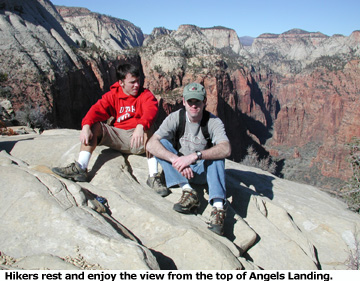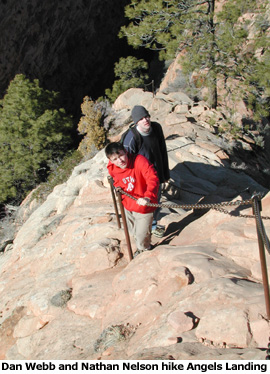Angels Landing: Strenuous Hike
Novice Hiker: Strained Muscle
By Nathan Nelson
 Recently I had the advantage of traveling with two friends to Zion Park in southern Utah, where we hiked Angels Landing. It was challenging, difficult, and dangerous. But it was also a lot of fun. It was an experience that I'll remember, and, now that I think about it, feel, for years to come. So let me start from the beginning...
Recently I had the advantage of traveling with two friends to Zion Park in southern Utah, where we hiked Angels Landing. It was challenging, difficult, and dangerous. But it was also a lot of fun. It was an experience that I'll remember, and, now that I think about it, feel, for years to come. So let me start from the beginning...
I woke at 6:30 am, under the incorrect assumption that we were leaving at a half past seven. So when Dave Webb and his son, Dan, knocked on my door 7 a.m., I rushed around for two minutes inside of my apartment before kissing my wife good-bye and running her through "should I die on this hike" instructions before I emerged, disheveled and unprepared for what would be a long and arduous (and eventually, rewarding) hike.
We drove for 3 hours south on I-15 before we reached Zion's Park (but not before driving through LaVerkin, a "U.N Free Zone!"), and Virgin (by law, all residents must own at least one gun.) Our first stop was the Weeping Rock. This rock actually has water dripping off of it year-round. Of course, in February the rock doesn't so much drip as it does form icicles all over its surface. Water runs under the ice, looking like "snails," so aptly described by Dan.
At noon, we approached the bottom of Angels Landing. We dutifully started up the trail, which, at the bottom is simply a concrete path that you follow as it weaves its way up in switchbacks, left and right against the mountain. About two-thirds of the way up, the ascent became significantly steeper. My breathing became a little labored, and it made me grateful that earlier I'd taken a puff of my inhaler for asthma. I'm actually somewhat athletic. I've even run long-distance before, but I was a little out-of shape for this hike.
 In the Zion Map and Guide that the National Park Service puts out, it states bluntly, "Falls from cliffs on these trails have resulted in death." It's not a perfectly safe hike, but there are chains that have been bolted into the mountain that you can hang on to on the steeper and more dangerous parts of the hike. There were points where we could look out over the mountain, and only a few feet to our left or right the cliff awaited our misstep - an 800 foot drop to the bottom of Angels Landing. This brings me to the inevitable assumption: Was Angels Landing named as such because you can hike to the top as a mortal; and fall to the "landing" as an angel? With that assumed-cliché out of the way, let me tell you - I was frightened witless, regardless of what I told Dave about my previous hiking experience. (I told him that I had plenty of experience.)
In the Zion Map and Guide that the National Park Service puts out, it states bluntly, "Falls from cliffs on these trails have resulted in death." It's not a perfectly safe hike, but there are chains that have been bolted into the mountain that you can hang on to on the steeper and more dangerous parts of the hike. There were points where we could look out over the mountain, and only a few feet to our left or right the cliff awaited our misstep - an 800 foot drop to the bottom of Angels Landing. This brings me to the inevitable assumption: Was Angels Landing named as such because you can hike to the top as a mortal; and fall to the "landing" as an angel? With that assumed-cliché out of the way, let me tell you - I was frightened witless, regardless of what I told Dave about my previous hiking experience. (I told him that I had plenty of experience.)
Something that I found interesting was that since the mountain is largely made of sandstone, the chains actually wear into the mountain, and create as deep as a 5-inch impression into the rock. So you have to reach into the mountain to find a sure handhold on the chain sometimes. Once you hike up to a certain height, the cement path disappears, and you end up walking on a more rugged, narrow path. I found it much more interesting than the urban feel of concrete under my boots. Cement paths make me feel like I'm just doing something that hundreds of others have done before. When I hike, I want to feel that I'm the first one to make the path. So I appreciated the more secluded feel of a non-cement path that introduced itself later on in the journey.
At almost 2 pm, we reached the plateau. I felt that I'd accomplished a great thing. Indeed, 2.5 miles up a steep incline seemed to be a feat of sorts. I looked out over the side of the cliff and drew in a breath; I could still see the road that led to Angels Landing, 1000 feet below. But the cars on it seemed to be the size of small paperclips, going at the speed that you'd expect from the minute hand of a clock. The river down in the basin appeared to stand still. It was eerily thrilling.
What do you do when you've reached the top of a one thousand-foot mountain? Dan and I immediately scouted out the highest rock on Angels Landing and scaled it eagerly. Disappointingly, the view didn't really change any; the rock was only about eight feet in height. But it made us feel superior to the hiker-turned-cameraman, Dave, who was down on the ground instructing us in different "I Beat the Mountain" poses.
I took some pictures with my little Wal-Mart digital camera, but it's hard to capture the scope of what you're looking at, in terms of falling distance, on film.
My legs grew tired as we moved back down the hill, wobbling from the strain of the hike up Angels Landing. Several times, for stability reasons, I had to grab onto rocks or tree limbs to keep from falling off of the hill. Once, as we were hiking down, I slipped a little, and it made me feel dizzy. It gave me an immediate perspective on how fragile this mortal frame of mine is.
When we finally reached the bottom of the mountain, I looked up and saw the top of Angels Landing. It stood magnificently, daring against the sky. But I've already beaten the mountain. It's time to move on to another hike in Zion Park.
Copyright Nathan Nelson
